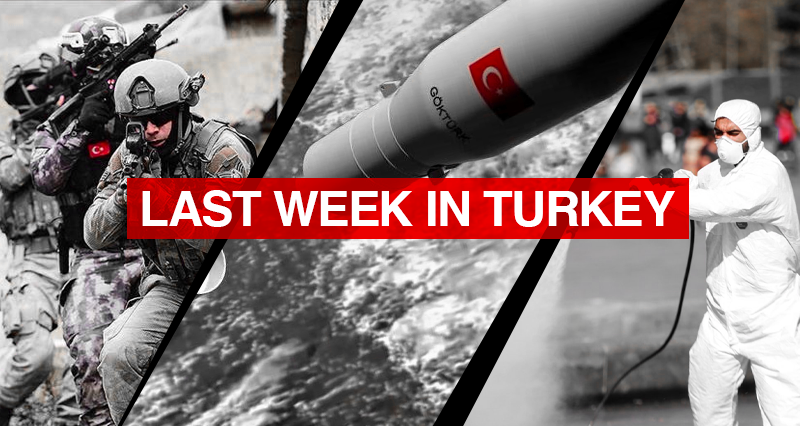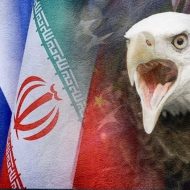Last week, the Turkish public agenda had been busy with three main topics.
The first topic had been the critics against the United States and NATO over the lack of support towards the counter terrorist efforts of the Turkish government.
The second topic was the newly announced Turkish Space Program, and its possible future missions of human spaceflight, including even a mission to the Moon.
The third topic was the ongoing lockdowns, the normalization plans and the vaccination efforts of the Turkish Health Ministry.
US criticized for lack of support to Turkey’s counter terrorism efforts
The Turkish President Erdoğan has criticized the absent role of the United States, in his country’s efforts against the PKK terrorism on Saturday. He expressed his criticism, after bodies of 13 Turkish citizens were found during Turkey’s anti-terror operation in Gara northern Iraq in the previous week.
The President said, “Recently, we all went through a process in which the Turkish-American friendship was seriously tested.”
“We could not see the support and solidarity we expected from our NATO ally, especially in combating the PKK terror group and its extensions”, he added.
“Turkey expects a clear stance from all of our allies, especially after the treacherous terrorist attack in which 13 Turkish people were martyred last week,” Erdoğan said.
Omer Celik, spokesman for the governing Justice and Development Party, said that “Turkey expects complete support from its allies in its fight against terrorism,” on Thursday.
“We reacted to two statements of the US,” Celik told reporters in the capital Ankara during a meeting of the party’s Central Executive Board.
“As our ally, we expect the US to respect Turkish democracy, and we do not find it right to make statements as if it gives instructions or directions to Turkish judicial institutions,” Celik said.
“We expect absolute respect for Turkish democracy. We expect absolute respect for Turkey’s judiciary,” he added.
His remarks came shortly after the US State Department issued a much-criticized conditional condemnation of the massacre, saying in part: “If reports of the death of Turkish civilians at the hands of the PKK, a designated terrorist organization, are confirmed, we condemn this action in the strongest possible terms.” The US ambassador to Turkey was later summoned by Turkey to register its displeasure.
Celik also said the fact that such a statement was made during US Secretary of State Antony Blinken’s term, should be “seriously questioned.”
Turkey’s Minister of Defense, Hulusi Akar has also highlighted the importance of unity and solidarity among allies in the fight against terrorism, at a NATO meeting of defense ministers on Thursday.
At the virtual meeting, Akar cautioned that license restrictions, sanctioning attempts, and threats against Turkey would weaken the alliance.
He also underlined that Ankara would resolutely continue fighting the many terror groups that it faces, including Daesh/ISIS, the PKK/YPG, and Fetullah Terrorist Organization (FETO).
He noted, “We clearly stated that the PKK and YPG are the same terrorist organization. In addition, while the efforts to expand NATO’s mission in Iraq are continuing, we also stated that the PKK terror group is the biggest obstacle to NATO’s mission”.
Former Chief of the General Staff Intelligence Office, Retired Lieutenant General Ismail Hakki Pekin, has made a proposal about the American/NATO help towards YPG terrorist group that caused huge waves in Turkey.
Reminding that Israel had attacked Iran, Iraq and Lebanon, as well as the fact that this country has hit Iranian trucks and warehouses, the General said that Turkey, which is fighting against the terrorism, can act in the very same way.
“The whole world knows that PKK/YPG attacks on Turkey. Israel strikes wherever the terrorist threat comes from. Those terrorist trucks can also be hit.”
Turkish space program
Turkey has announced its national space program and space agency, and President Erdogan has announced the roadmap based on realistic and competitive goals as he defined, on February 9th.
“The national space program will carry our country to an upper league in the global space race,” Erdogan stressed during the introductory meeting in the capital Ankara.
“The first and most important mission of the program is to make the first contact with the Moon in our Republic’s centennial year, 2023,” Erdogan said.
Noting that the goal will be completed in two stages, Erdogan said that at the first stage, a rough landing would be made on the Moon at the end of 2023 through international cooperation.
“The second stage will be made through Turkey’s own rockets in 2028. As we make a soft landing on the Moon, we will be one of the few countries that could conduct scientific activities on it.”
Under its national space program, Turkey aims to set up a regional positioning and timing system, Erdogan noted.
With this regional positioning system, to be created with an innovative method through using satellites along with ground systems, Turkey will end its foreign dependency, he stressed.
“We will carry the success we have achieved in the defense industry to the space area and ensure the formation of a strong and productive ecosystem,” he noted.
A Space Technology Development Region to welcome domestic and foreign investors will be established, the president also said.
Noting that the country will develop effective and competent human resources in the field of space, Erdogan said the “final goal is to send a Turkish citizen to space with a scientific mission.”
Touching on the government’s works in the field of space, Erdogan said 2.1 billion Turkish liras (nearly 300 million USD) had been provided for 56 projects about satellite, space, launching systems, and space equipment in the last 18 years.
As the country develops new technologies such as observation satellites, Turkey will ensure full security of information obtained from satellites through Turkish engineers’ software, Erdogan added.
“Turkey’s National Space Program will raise the country above its current capabilities and make it an important player in the space economy,” Industry and Technology Minister Mustafa Varank stated on Wednesday.
Noting the country’s success in the defense industry, Varank said the initiative would help Turkey secure experience in space for the technology it has developed.
“The program will pave the way for Turkey […] to become an important power in the field of space economy,” Varank said.
The program will both make Turkey a country that has much more value-added production, and make its citizens proud, he underlined.
Noting that the use of space for civilian purposes would require international cooperation, the minister said that Turkey is at the signing stage of agreements with Pakistan and Azerbaijan on its space agency.
On the other hand, Russia and Turkey are preparing a bilateral agreement for cooperation in the space industry, according to the Russian space agency.
The agreement is expected to lay “a solid foundation for the further successful cooperation between countries in the field of space,” Roscosmos State Corporation for Space Activities, as saying.
Roscosmos welcomed Turkey’s interest in developing bilateral cooperation with Russia in the space industry and said it is ready for full cooperation with the Turkish side.
“Our countries have already built strong business contacts in the space sector. We have been discussing the possibility of implementing individual space projects for quite a long time, and with the creation of the National Space Agency in Turkey, our dialogue is reaching a new level.”
“We are always happy to work with Turkish colleagues and look forward to obtaining their proposals for the development of joint space projects,” it said.
Several prominent United Arab Emirates (UAE)’s newspapers praised Turkey for its congratulatory message to the UAE for successfully placing a spacecraft in orbit around Mars.
Normalization plans and vaccination efforts on the pandemic
Turkey has begun its mass COVID-19 vaccination campaign on January 14, starting with healthcare workers and then the elderly.
Since early December, Turkey has also been implementing curfews on nights and weekends to curb the spread of the virus.
Despite the tough fight that Turkish Health Ministry puts forward, the disease has spread to 6546 (601 symptomatic) new patients and has taken 77 (28.060 in total) lives as of February 21st.
Last week, ahead of starting to give second doses, Health Minister Fahrettin Koca said Turkey intends to vaccinate 60% of its population.
Turkey ensured at least 15 million COVID-19 vaccine doses and reached agreement for over 100 million vaccine doses in total, he said.
The Ministry has so far administered over 6 million doses across the country, according to official figures.
According to Turkish Health Ministry data, over 5.52 million people to date have received their first doses of a vaccine against the novel coronavirus, while second vaccine doses were given to nearly 1.06 million.
The country has received multiple shipments of inactive CoronaVac vaccines developed by the Chinese Sinovac firm.
“Inactive novel coronavirus vaccines are less likely to cause unwanted side effects,” Turkey’s health minister said on Friday.
“Underlining that this kind of vaccine was also less susceptible to becoming ineffective against new mutations of the virus,” Fahrettin Koca said on Twitter “Turkey continued working to procure the best possible vaccine options for the country’s people.”
He added the country would also receive 500,000-800,000 doses of the BioNTech vaccine in February; with the total number reaching 4.5-5 million by the end of March.
Koca has announced on Monday the number of COVID-19 cases on a provincial basis between February 8 and 14, as part of a new weekly measurement.
“From now on, we will announce the number of cases for the past seven days at the beginning of each week,” Fahrettin Koca said on Twitter.
“Turkey will start to gradually normalize from coronavirus restrictions as of March 1st,” Turkey’s health minister said on Saturday.
Underlining that they are working carefully on normalization steps, Fahrettin Koca said on twitter that “The process will start with provincial public health councils dealing with four risk levels in line with Health Ministry criteria.”
Announcing earlier this week an easing of restrictions starting in March, President Recep Tayyip Erdogan said provinces will be categorized as low, medium, high, or very high risk based on infection rates and the vaccination process.









Leave a Reply